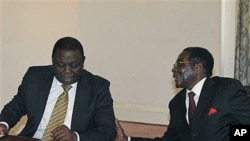Despite a troubled start, Zimbabwe is making progress towards producing a new constitution. There is broad agreement on most constitutional principles between the majority party in the legislature, the Movement for Democratic Change, and President Robert Mugabe’s ZANU-PF party.
A key stipulation in the political agreement that brought the MDC and ZANU-PF into Zimbabwe's coalition government two years ago was that a mechanism to draft a new constitution should be put in place. This led to the formation of a multiparty Constitutional Parliamentary Committee that was to seek the views of Zimbabweans, at home and abroad, about a new constitution.
The process stalled and deadlines slipped, evaporated and only resumed several months later when Mr Mugabe and Morgan Tsvangirai, MDC leader and prime minister in the inclusive government called on the public to attend consultation meetings to say what they wanted in a new constitution.
From July to October last year nearly 5,000 meetings attended by a million people were held around the country. Most of those who attended were members of ZANU-PF. One MDC loyalist died after being attacked at a public meeting in Harare and independent observers say other meetings were disrupted by ZANU-PF supporters.
Co-chairperson of COPAC Douglas Mwonzora, a lawyer and an MDC legislator was arrested last month and charged with public violence at a rally in rural Zimbabwe, released on bail three weeks later. He denies the charges. Mwonzora told VOA he hopes there will be no further delays.
"Assuming that we get enough funding, secondly [assuming] that the MDC leadership in COPAC is not continuously arrested. We have lost about a month because of the continued detention of an arrested person," he said.
Paul Mangwana, also a lawyer and legislator is ZANU-PF’s COPAC co-chairperson. He says Zimbabwe needs a new constitution because the existing charter was written in London in 1979 to end the liberation war.
"It became a compromise document to achieve a cessation of hostilities," he said. "People were killing each other at that time, so people did not get an opportunity to write their own constitution, they were not consulted, it was simply imposed on them and it had some of the clauses which have led to the current problems Zimbabwe is going through."
He says ZANU-PF and MDC have agreed on most key principals for a new constitution, including an executive president. He said there was continuing disagreement about dual nationality. He said no one in the MDC would oppose ZANU-PF’s campaign for black empowerment of Zimbabwe’s companies.
He said the MDC also accepted that ZANU-PF’s policy of land reform that has evicted about 4,000 white farmers since 2000 was necessary. He said the future tenure of the confiscated land still needs to be decided.
"Land reform has taken place and is irreversible," he said. "The majority view, which has been arrived at, is 99-year leases transferable, which can be mortgaged with real rights, more like title deeds."
Douglas Mwonzora agrees MDC and ZANU-PF supporters broadly agree on many of the constitutional principles. But he says there will have to be further negotiations on some issues before a new charter is drafted and presented to the public in a referendum.
"Most of the areas in the constitution are basically agreed, but there [are] a few contentious issues, the issue of land of course, the issue of the executive presidency, the issue of dual citizenship. All these are going to have to be negotiated and we have put in mechanisms for the negotiations," said Mwonzora.
MDC legislator Eric Matinenga, the minister in charge of parliamentary and constitutional affairs, says public input for a new charter was more about current political differences than constitutional principles.
"For an example, do you want an executive president? People were looking at constitution making through the political eyes of what the current situation was," he said. "As MDC they will say we want a prime minister because they have got a prime minister in place. ZANU-PF will say they want an executive president because they have got an executive president in place. From a technical point of view there is not such a wide difference."
Matinenga said Zimbabwe’s political crisis did not result because the present constitution is deficient nor because there are insufficient laws. He said the main problem was "malicious" application of the law. Human-rights monitors say the MDC has been persecuted by partisan police and misuse of the law since it nearly beat ZANU-PF in elections in 2000.
"If you go back to the past 10 years to the state-sponsored murders, it is not that we did not have the law, it is the application of these laws. It is very sad," he said. "What is really important is to change the mind-set, to change the culture."
Mangwana said most Zimbabweans, led by the then-new MDC party, rejected a new constitution in 2000. But he says the one being drawn up now is not substantially different to rejected charter. Mwonzora says a draft should be ready for a referendum by the end September.
Zimbabwe Makes Progress Towards New Constitution













